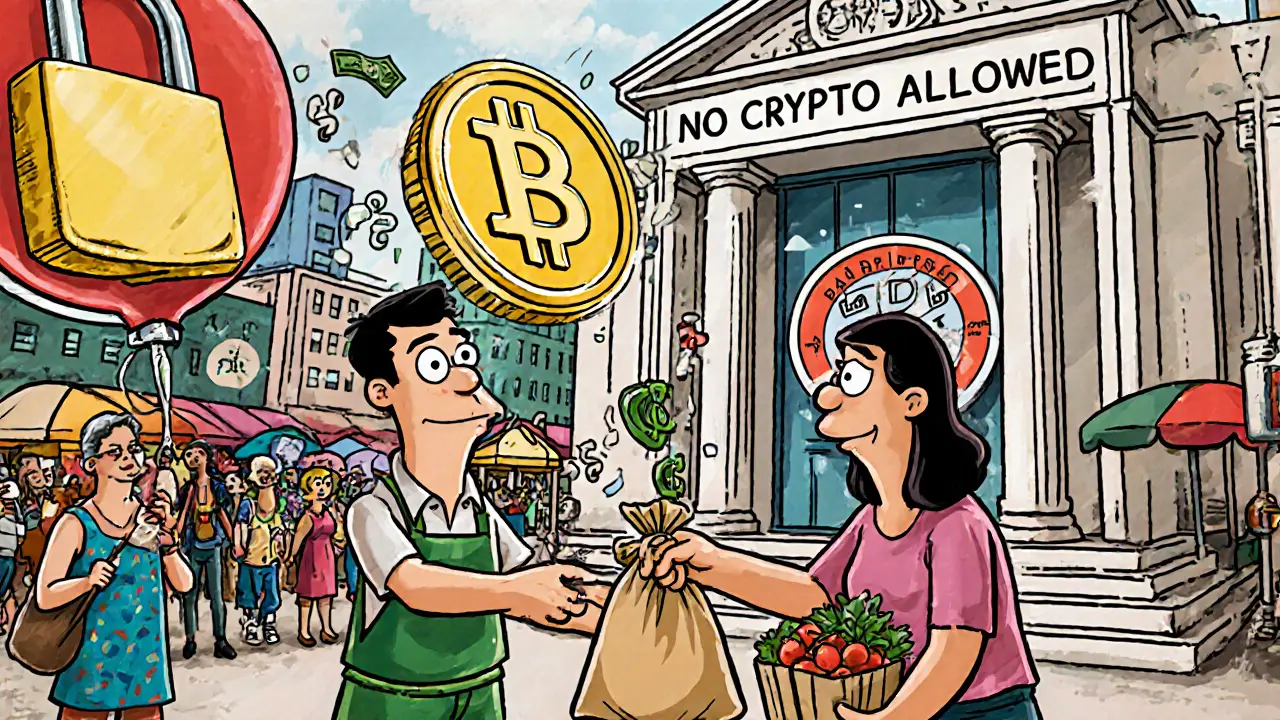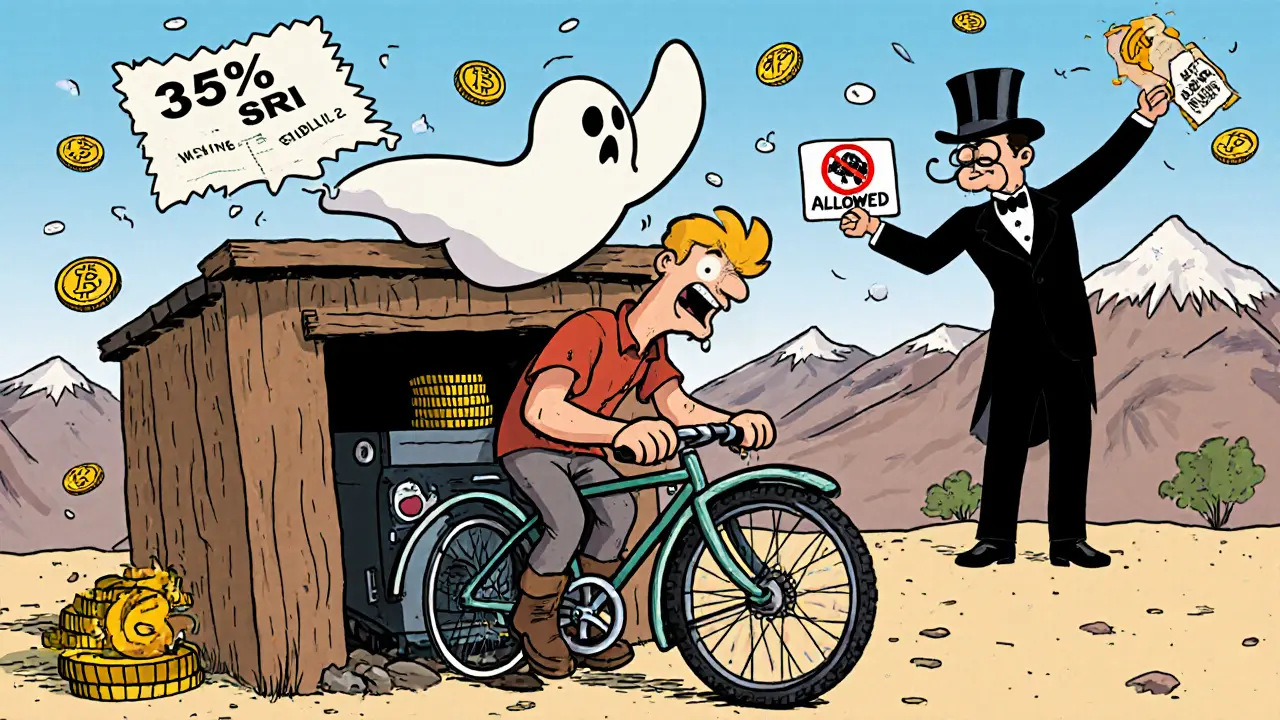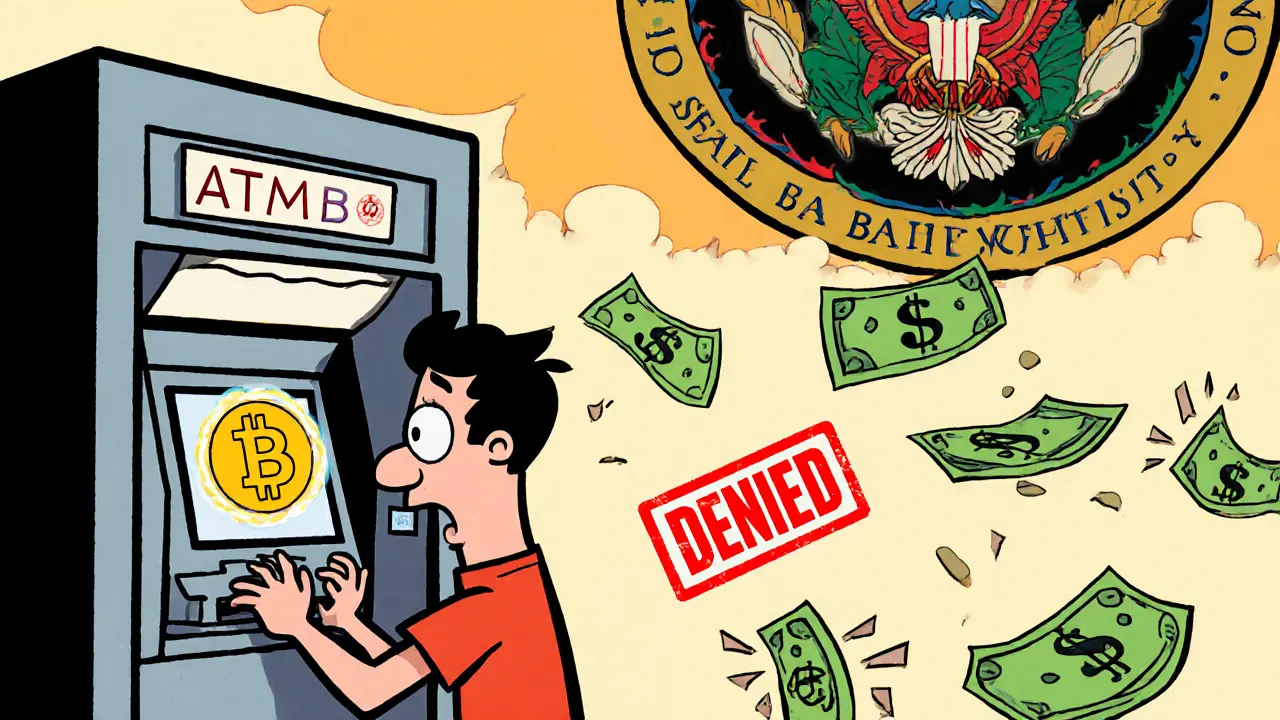Ecuador Remittance Cost Calculator
Send Money from Ecuador
Cost Comparison
| Method | Fee Rate | Fee Amount | Total Cost |
|---|---|---|---|
| Traditional Banking | 6.5% | $0.00 | $0.00 |
| Crypto (P2P) | 4.8% | $0.00 | $0.00 |
| Cost Difference | $0.00 |
In Ecuador, you can own Bitcoin. You can mine Ethereum. You can even trade crypto peer-to-peer with your neighbor. But if you try to use your bank account to buy or sell crypto, your transaction will be blocked. And if you do it more than once, your account might get frozen. This isn’t a glitch. It’s policy.
The Law Behind the Ban
Ecuador has been dollarized since 2000. That means the US dollar is the only legal tender. No pesos, no euros, no digital coins. That rule is written into the country’s Monetary Code. In 2022, the Central Bank of Ecuador (BCE) and the Monetary and Financial Policy and Regulation Board (JPRM) made it official: banks and financial institutions cannot process any transaction involving cryptocurrency. Resolution 001-22 and Resolution 002-23 didn’t just discourage crypto-they outlawed banks from touching it. The BCE doesn’t claim the power to ban crypto ownership. Instead, it bans banks from enabling it. That creates a strange situation: you can legally hold Bitcoin, but you can’t legally move it through the banking system. The goal? Protect the dollar. Ecuador’s economy relies heavily on remittances and US-dollar-based trade. The government fears that if people start using crypto as an alternative store of value or payment method, it could destabilize the entire monetary system.How the Ban Is Enforced
The Superintendency of Banks (SB) is the enforcer. They maintain a public list of 47 cryptocurrency platforms banned from working with Ecuadorian banks. If you send money to Binance, OKX, or Mercado Bitcoin, your bank’s automated system will catch it. These systems, required since January 2025 under Technical Standard 004-2024, scan for 47 specific transaction patterns linked to crypto exchanges. Banco Pichincha, the country’s largest bank with 38% of the market, automatically flags any transfer over $200 to a known crypto address. Users report account freezes lasting 3 to 14 days for first offenses. Repeat offenders face longer holds or even account closures. In 2024, the SB issued 12 formal sanctions against financial institutions for violating the ban, totaling $1.2 million in fines. It’s not just transfers. Using crypto to pay for goods or services is also illegal. Fines for businesses that accept Bitcoin or USDT as payment can reach $50,000 per violation under Article 144 of the Monetary Code. Even crypto-denominated contracts are void under Ecuadorian law.What People Do Instead
With banks off-limits, 385,000 Ecuadorians-about 2.2% of the population-have found ways around the ban. Most rely on peer-to-peer (P2P) trading. On platforms like Binance P2P, users connect directly with buyers and sellers. Many trade with local merchants who accept crypto in exchange for cash or goods. A 2025 survey found 68% of Ecuadorian crypto users use this method, though they pay higher fees and face greater security risks. Stablecoins like USDT are the workhorse of this underground system. Since they’re pegged to the US dollar, users convert crypto to USDT, then try to send it as a regular USD transfer. Sometimes it works. Sometimes it doesn’t. In Q2 2025 alone, 147 users reported having $382,000 frozen after their banks flagged these transfers as suspicious. Other workarounds include gift card exchanges, prepaid dollar cards from non-bank issuers, and cross-border services like Wise. These methods are slower, costlier (averaging 4.8% in fees), and less reliable than banking-but they’re the only options available.
Who’s Affected the Most
The ban hits the unbanked hardest. Nearly 42% of Ecuadorian adults don’t have a bank account, according to the World Bank’s 2025 Global Findex report. For them, crypto was supposed to be a lifeline-cheaper remittances, access to global markets, financial independence. Instead, they’re forced into riskier, less regulated channels. A 2024 study by Pontificia Universidad Católica del Ecuador found that 78% of crypto users convert their digital assets to cash through informal networks. The main reason? Lack of banking access. Only 39% use stablecoins as settlement tools, and even those face chargeback risks and no legal recourse if something goes wrong. Remittance corridors are the biggest driver of crypto use. Traditional remittance fees average 6.5%. Crypto can cut that to under 1%. But with banks blocking the flow, people are stuck paying more to send money home-or using Telegram-based OTC desks, where 63% of all crypto transactions now occur, according to the IMF.The Legal Gray Zone
Here’s the twist: owning crypto isn’t illegal. Trading outside the banking system isn’t illegal. Mining isn’t illegal. Ecuador has 1,023 registered mining operations as of July 2025, up from just 100 in 2023. But none of them have bank accounts. They pay for equipment, electricity, and maintenance through third-party processors-adding 3-5% to every cost. The Internal Revenue Service (SRI) taxes crypto gains. Individuals pay up to 35%, corporations up to 25%. That means the government knows people are trading. They just don’t want banks involved. This creates a paradox: the state profits from crypto taxes but refuses to let people use the financial system to access it. The result? A thriving underground economy with no consumer protections, no dispute resolution, and no oversight.
What’s Coming Next?
There’s a bill in the National Assembly-Bill 6538-that could change everything. Introduced in May 2025 by Representative Shirley Rivera, it proposes a licensing system for crypto exchanges. Requirements include $500,000 in minimum capital, proof-of-reserves audits, and real-time monitoring tied to the Financial Analysis Unit (UAF). But it’s stuck. The bill was sent to three separate congressional committees. Industry analysts say it could take 18 months-or longer-to pass. Even if it does, it won’t fix the core problem: banks still won’t be allowed to interact with licensed exchanges. Meanwhile, the BCE is testing a Central Bank Digital Currency (CBDC). Prototype trials are scheduled for Q4 2025. If the CBDC becomes the official digital dollar, it could either replace crypto entirely-or force the government to reconsider its stance. But for now, the CBDC is just another tool to control money, not expand access to it.The Bigger Picture
Ecuador’s crypto ban is one of the strictest in Latin America. Brazil and Argentina have licensed exchanges. Colombia lets banks offer crypto services. Ecuador’s market is tiny-just $185 million in activity-compared to $1.2 billion in Brazil. Venture capital? Only $12.7 million flowed into Ecuadorian blockchain startups in 2024. In Brazil, it was $210 million. Experts are divided. Dr. María Fernanda Espinosa of ILPES calls the ban a barrier to financial inclusion. She estimates Ecuador loses $18 million a year in potential blockchain savings from remittances. But BCE advisor Dr. Carlos de la Torre argues that in a dollarized economy, crypto is a threat to confidence. He points to Argentina’s volatility as a warning. The truth? Ecuador’s ban isn’t about stopping crypto. It’s about controlling money. And for now, the government is willing to sacrifice financial innovation-and the needs of millions of unbanked citizens-to do it.What You Should Know If You’re in Ecuador
If you’re using crypto in Ecuador:- Never send crypto funds through your bank account. It will be flagged.
- Use P2P platforms like Binance or Paxful. Verify your counterparty. Meet in person if possible.
- Stick to USDT for settlements. It’s the most reliable stablecoin here.
- Keep records of all trades. The SRI audits crypto gains.
- Don’t use crypto to pay bills or buy goods. You could face fines.
- Don’t assume your transaction is safe just because it went through. Chargebacks happen.
Is it illegal to own Bitcoin in Ecuador?
No, owning Bitcoin or any cryptocurrency is not illegal in Ecuador. The ban only applies to banks and financial institutions-they cannot process crypto transactions. Individuals can buy, sell, hold, and trade crypto using peer-to-peer methods or offshore platforms without breaking the law.
Can I use my Ecuadorian bank account to buy crypto?
No. Ecuadorian banks are legally prohibited from processing any transaction involving cryptocurrency. Any transfer to known exchange platforms like Binance or OKX will be blocked. Attempting to do so may result in account freezes or sanctions. You must use peer-to-peer or non-bank channels instead.
What happens if my bank account gets frozen for crypto activity?
If your bank flags a crypto-related transaction, your account may be frozen for 3 to 14 days on a first offense. Repeat violations can lead to longer holds or permanent closure. There is no formal appeal process. The Superintendency of Banks does not guarantee reversal, and banks are not required to explain their decisions. You’ll need to contact your bank directly, but success is rare.
Are crypto earnings taxed in Ecuador?
Yes. The Internal Revenue Service (SRI) taxes cryptocurrency gains as income. Individuals pay up to 35% on profits from crypto sales, and corporations pay up to 25%. You are legally required to report these gains, even if you used P2P methods. Failure to report can lead to penalties.
Is there a chance the ban will be lifted soon?
Not soon. A bill (Bill 6538) proposing a licensing system for crypto exchanges was introduced in May 2025, but it’s stuck in three congressional committees. Experts estimate it will take at least 18 months to pass-if it passes at all. The Central Bank shows no sign of relaxing its stance, and its own CBDC project may further reduce the need for private crypto.
Why do so many Ecuadorians still use crypto despite the ban?
Because traditional banking fails them. Nearly 42% of adults are unbanked. Remittance fees are high (6.5%), and access to global finance is limited. Crypto offers cheaper, faster alternatives-even if it’s risky. For many, the benefits outweigh the dangers, especially when there’s no other option.

Noriko Yashiro
November 11, 2025 AT 01:04Also, 63% of crypto trades happening on Telegram? That’s not innovation-that’s survival.
Diana Dodu
November 11, 2025 AT 20:17David Billesbach
November 13, 2025 AT 07:20Atheeth Akash
November 14, 2025 AT 16:28FRANCIS JOHNSON
November 14, 2025 AT 21:19One day, the Central Bank will look back and realize they didn’t stop crypto. They just made it stronger. 💪🌍
Michael Brooks
November 16, 2025 AT 10:40Joy Whitenburg
November 16, 2025 AT 15:01Kylie Stavinoha
November 18, 2025 AT 04:35Ironically, the more they clamp down, the more they validate the need for decentralized systems. The ban isn’t a shield. It’s a confession.
Andy Purvis
November 19, 2025 AT 12:24James Ragin
November 20, 2025 AT 02:59Raymond Day
November 20, 2025 AT 19:37